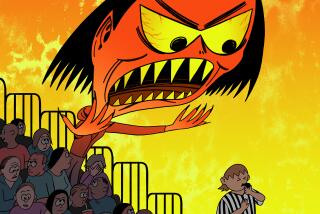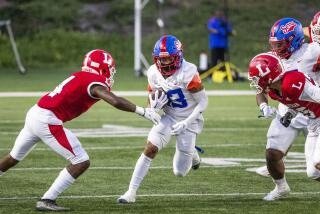The Case for Reforming Kids’ Sports
- Share via
Health experts today universally recommend that children find ways to be more physically active. Almost one in five children are obese, and sedentary lifestyles are thought to be largely to blame. With the decline in school physical education programs and neighborhood pickup games, more parents are seeking fitness opportunities for their children by enrolling them in organized youth sports. Along with exercise, most parents hope their children learn a thing or two about discipline, teamwork and sportsmanship.
However, this new book by Fred Engh casts grave doubts on whether youth sports are as healthy for children as many of us would like to believe. Engh, president of the National Alliance for Youth Sports, contends that adults and our culture have combined to ruin what should be a good experience for kids. In too many playing arenas today, Engh says, children are belittled, coaches scream, parents argue and values like sportsmanship are given up for dead.
The major problems destroying youth sports, Engh says, are overzealous parents, untrained administrators and win-at-all-cost coaches. Parents, Engh writes, tend to act their worst while on the sidelines of their kids’ games because of their own egos or fears that their children’s performance will reflect poorly on them. The emphasis on winning, he says, is teaching kids that any method used to win--including cheating, brutality and intimidation--is OK.
Engh offers proof that something stinks in youth sports. For example, 70% of the 20 million children who participate quit before age 13 (an age when kids especially need community ties and healthy involvement with peers, health experts say). A Minnesota study reported that 45% of kids said adults had yelled at them, insulted them or called them names while playing sports. Almost one-quarter said they have been pressured to play while injured.
“Why Johnny Hates Sports” makes a compelling argument for cleaning up youth sports. Engh uses examples and anecdotes to illustrate scenes parents have undoubtedly witnessed at the playing fields. He also describes how decent coaches and parents should act and how sports programs can be run to give the games back to the kids. Some of his suggestions, such as doing away with all-star competitions, may not be popular. But surely, anyone involved in youth sports would do themselves a favor by reading this book. And imagine the favor we’d all be doing for our kids.
More to Read
Go beyond the scoreboard
Get the latest on L.A.'s teams in the daily Sports Report newsletter.
You may occasionally receive promotional content from the Los Angeles Times.










